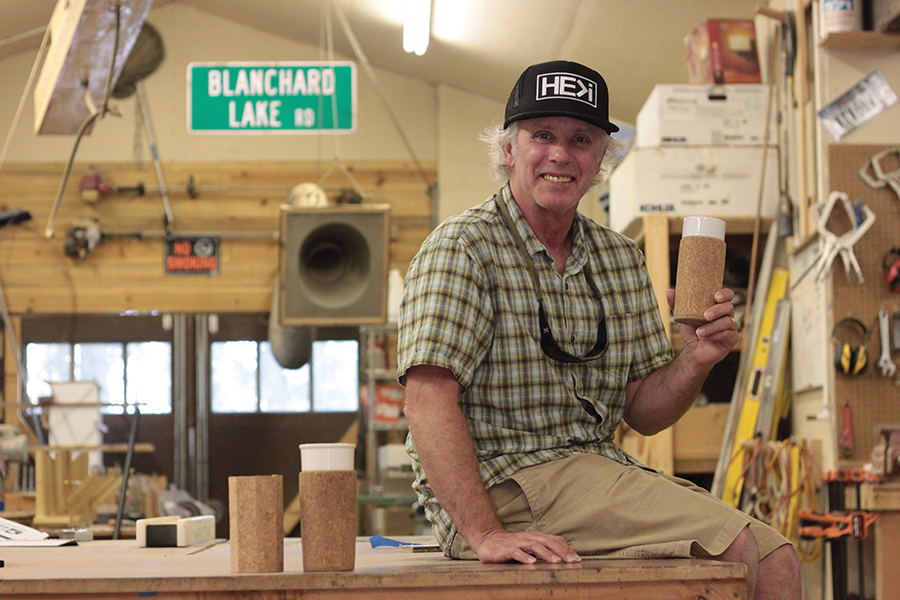About a year ago, Whitefish builder Robert Knox broke yet another coffee mug. It wasn’t the first, and probably won’t be the last mug to meet its end at a construction site, but Knox was tired of the waste.
Then, while designing a fly fishing rod, it hit him: a porcelain mug wrapped in cork. Not only would it be durable, it would be environmentally friendly and would save him from drinking hot liquids out of a metal cup.
After a quick online search found no products like it, Knox decided to pursue what is now the Cortiça mug.
“I knew I had a great product and a great idea, I just needed the money to put it together,” Knox said.
Instead of going the traditional route of pitching his idea to investors and having them buy into the business, Knox went online to Kickstarter and the world of crowd-funding websites.
By the time he was finished fundraising online in July last year, 1,486 people had backed his project for a total of $64,739.
As the world continues to stitch together an online network with more access, social media, and more ideas flooding the Internet, spaces such as Kickstarter have emerged for budding inventors and business entrepreneurs, where their ideas can meet a much larger audience than ever before, and project funding can follow.
Other crowdfunding websites include GoFundMe, Indiegogo, Patreon, and many more.
On Kickstarter, which started up in 2009, the site provides the platform to connect the people with ideas – ranging from films, games, and art to businesses, technology, and design – to backers who would help turn those dreams into reality through financial contributions.
Once a project creator sets a funding goal and a deadline, people can pledge money to make the project come to life. The creators maintain 100 percent ownership of their work; backers do not profit financially. Instead, project creators thank backers with various rewards depending on how much is pledged for the project.
For example, when it came to Knox’s mug, someone pledging $20 would receive a mug delivered within the Flathead Valley. A $60 pledge meant two mugs, and $40 meant a mug could be shipped to Canada.
According to Kickstarter, 44 percent of the projects on its site meet their funding goals.
“Kickstarter was a great format for me. They did exactly what they said they were going to do. They have a great community of people that support them,” Knox said. “The Kickstarter format for me was a homerun, for sure.”
Other local businesses have accessed the world of online crowd-funding to get off the ground. One of the notable examples is the Bonsai Brewing Project in Whitefish, which was fully funded in August of 2013 and raised more than $17,800 to finance the brewery.
The website has also helped finance many artistic projects in the valley, including the decade-long documentary on Hungry Horse.
According to Kickstarter, Montanans have been on board with pledging projects since 2009. Of the more than $1.6 billion that has been pledged by more than 8.2 million people on Kickstarter for more than 80,000 creative projects, Montanans have pledged $4,400,764 for 645 projects.
Crowd-sourced funding has also made its way to the state Legislature, where Rep. Chuck Hunter, D-Helena, has proposed House Bill 461, which would adjust Montana laws to allow crowdfunding for startup businesses.
This would allow for low-dollar investments from large numbers of people, though according to Jennifer McKee, communications director for the state Commissioner of Securities and Insurance and Auditor’s Office, these investments would be different than those solicited from sites such as Kickstarter.
Instead of contribution fundraising, HB 461 would allow for people to buy equity shares in a business.
“They’re not contributing,” McKee said. “They’re buying.”
Currently, if anyone sells a share of a future and growing business, they would need to register with the state, McKee said. That would change if this bill became law.
While researching his Cortiça mug idea, Knox said he knew he could find investors, but he wanted to maintain ownership of his product. He also found that with the marketing, making the video for the website, and general work of keeping up with nearly 1,500 investors, Kickstarter isn’t a free pass to easy cash.
“I would completely recommend it to other people. I think with my product I could have gone out and find private investing in it for sure, but I would have been giving away part of my share, part of my company, to make that happen,” Knox said. “I would still highly recommend it for individuals. It’s not free money, by any sense. You work for it.”
